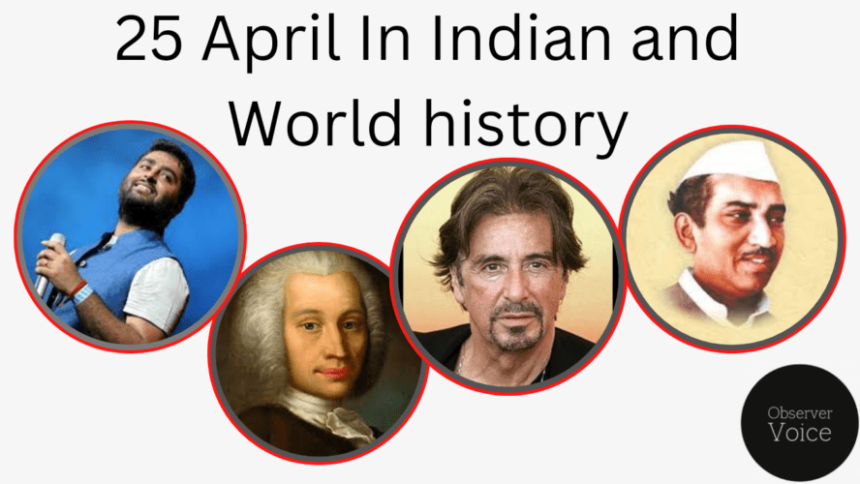World History Events:
- 563 BCE: Siddhartha Gautama, who later became known as Buddha, is traditionally believed to have been born on this day in Lumbini, now part of Nepal.
- 217 CE: Roman Emperor Caracalla is assassinated. He was known for his brutality, including the massacre of many inhabitants of Alexandria.
- 876 CE: The Battle of Dayr al-‘Aqul is fought between the forces of the Abbasid Caliphate and the Saffarid dynasty. The Abbasids emerge victorious, solidifying their control over much of Iran.
- 1271: Following a two-year suspension, the Second Council of Lyons reconvenes under Pope Gregory X. This council aimed to reunite the Eastern and Western Christian Churches but did not achieve its goal.
- 1730: Shearith Israel, the first synagogue in New York City, is dedicated.
- 1820: The Venus de Milo is discovered on the Aegean island of Melos (Milo in modern Greek). It’s an ancient Greek statue, believed to depict Aphrodite, the Greek goddess of love and beauty.
- 1866: Italy and Prussia form an alliance against Austria-Hungary.
- 1904: Longacre Square in Midtown Manhattan is renamed Times Square after The New York Times, which moved its headquarters there.
- 1913: The 17th Amendment to the United States Constitution, requiring direct election of senators, is ratified.
- 1918: World War I: The Battle of the Lys begins. It was a major battle between German and Portuguese forces on the Western Front.
- 1943: World War II: The discovery of a mass grave of Polish prisoners of war executed by Soviet forces in the Katyn Forest Massacre is announced.
- 1959: A team of computer manufacturers, users, and university people led by Grace Hopper meets to discuss the creation of a new programming language that would be called COBOL.
- 1974: Hank Aaron of the Atlanta Braves hits his 715th career home run, breaking Babe Ruth’s record.
- 1992: Retired tennis great Arthur Ashe announces that he has AIDS, acquired from blood transfusions during one of his two heart surgeries.
- 2005: Over four million people attend the funeral of Pope John Paul II.
- 2013: The World Health Organization confirms that the H7N9 bird flu, a strain previously not known to infect humans, has sickened at least 16 people in China, six of whom have died.
- 2018: The United Nations Security Council rejects a Russian resolution condemning “aggression” against Syria by the United States and its allies over a suspected chemical weapons attack.
Special Days:
- Buddha Jayanti: Celebrated by Buddhists around the world, it commemorates the birth, enlightenment, and death of Gautama Buddha.
- International Roma Day: Recognizes and celebrates Romani culture and raises awareness of the issues facing Romani people.
- National Empanada Day: A day to celebrate and enjoy the delicious savory pastries known as empanadas, which are popular in various Latin American and Spanish-speaking countries.
- Draw a Bird Day: Encourages people to draw birds and appreciate the beauty of these creatures.
- Trading Cards for Grown-ups Day: A day for adults to reminisce about their childhood trading card collections and perhaps engage in trading card-related activities.
- Zoo Lovers Day: A day to celebrate zoos and the conservation efforts they undertake to protect endangered species.
- All is Ours Day: A day to reflect on the abundance of resources on Earth and to appreciate the world around us.
- Be Kind to Lawyers Day: A humorous day to show appreciation and kindness to lawyers, who are often the subject of jokes and criticism.
- Free Cone Day: Some ice cream shops and chains offer free cones to customers on this day, encouraging people to enjoy a sweet treat.
- Dog Farting Awareness Day: An unusual day that aims to raise awareness about the digestive health of dogs and the importance of proper nutrition
1. Introduction:
- Brief overview of the significance of exploring historical events on April 8th in India.
2. Jallianwala Bagh Massacre (1919):
- Discussion of the events leading up to the Jallianwala Bagh massacre on April 13, 1919.
- Mention of the arrest of Satya Pal and Saifuddin Kitchlew on April 8th, 1919, which heightened tensions.
- Description of the tragic massacre and its impact on India’s struggle for independence.
3. Quit India Movement (1942):
- Overview of the Quit India Movement launched by the Indian National Congress on August 8, 1942.
- Emphasis on the demand for an end to British rule in India.
- Significance of the movement as a turning point in India’s fight for independence.
4. Adoption of the Constitution of India (1950):
- Discussion of the adoption of the Constitution of India by the Constituent Assembly on January 26, 1950.
- Explanation of the principles enshrined in the Constitution, including justice, liberty, equality, and fraternity.
- Importance of the Constitution in shaping India as a democratic nation.
5. Launch of Aryabhata Satellite (1975):
- Highlighting the launch of India’s first satellite, Aryabhata, into space on April 19, 1975.
- Explanation of the significance of India’s entry into space exploration.
- Mention of the satellite’s namesake, the ancient Indian mathematician and astronomer Aryabhata.
6. Indian Premier League (IPL) (2009):
- Overview of the commencement of the Indian Premier League’s second season on April 8, 2009.
- Description of the IPL’s role as a popular cricket tournament and cultural phenomenon in India.
- Mention of its international significance and massive viewership.
7. Launch of South Asia Satellite (2017):
- Explanation of the successful launch of the South Asia Satellite, also known as GSAT-9, on May 5, 2017.
- Description of the satellite’s purpose in providing communication and broadcasting services to South Asian countries.
- Significance of the satellite in fostering regional cooperation and development.






